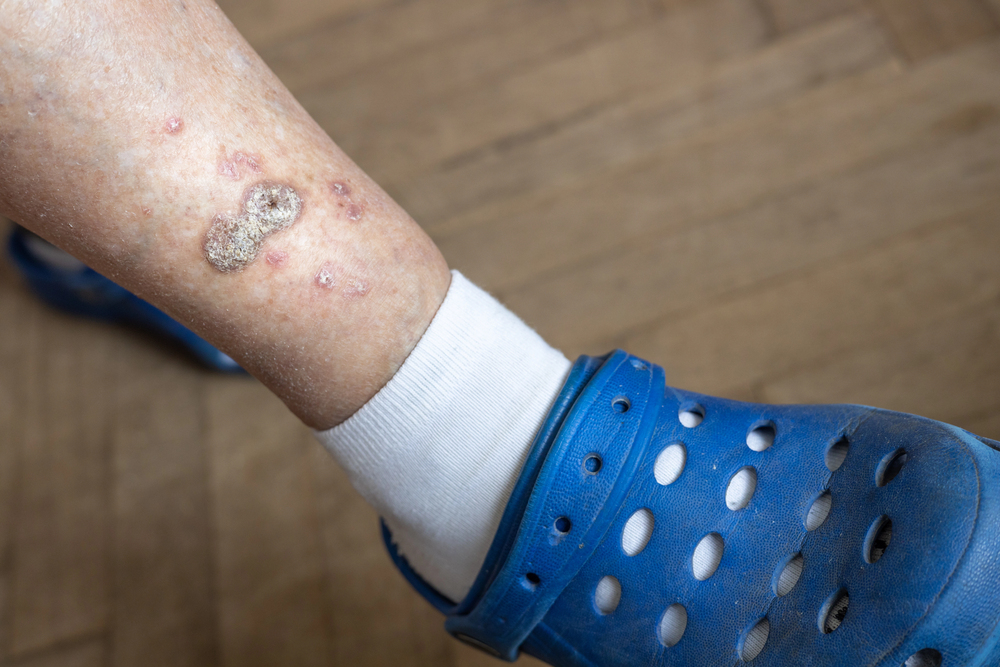The Nursing Home Law Center is committed to providing the legal resources necessary to hold negligent facilities accountable.
Can You Sue a Nursing Home for Bed Sores?
Families often ask, “Can you sue a nursing home for bed sores?” The answer is yes—when a resident develops pressure ulcers due to poor care, there may be several legal grounds for filing a claim.
Bed sores are painful wounds that form when a person remains in the same position for too long without relief. These injuries are prevalent in nursing home residents and are widely recognized as a warning sign of poor care.
Developing bedsores is often preventable with basic steps like repositioning, adequate nutrition, and proper hygiene. When staff fail to take action, it may amount to neglect. If your loved one has suffered due to bedsores in a nursing home, an experienced nursing home abuse attorney can help your family pursue compensation.

Legal Rights of Nursing Home Residents
Federal and state regulations give nursing home residents the right to receive adequate care that protects them from preventable injuries like pressure sores.
Facilities that accept Medicare or Medicaid must comply with the Nursing Home Reform Act, which requires care plans that prevent decubitus ulcers through regular repositioning, skin assessments, and proper nutrition.
When assisted living and medical facilities allow a resident to develop or suffer from untreated bedsores, it may signal a breach of that legal duty.
Residents are entitled to live in a safe, clean environment free from patient neglect. If those rights are violated, families may have legal grounds to pursue compensation through nursing home pressure wound lawsuits, holding the facility accountable for the harm caused.
Grounds for Filing a Bedsore Lawsuit
There may be several legal grounds for filing a claim.
The most common is nursing home neglect, where staff fail to prevent or treat bedsores through regular repositioning, hygiene, or nutrition. In more severe cases, a pressure injury lawsuit may involve medical malpractice if licensed medical providers ignore or mismanage the injury.
Additional claims can include breach of contract or violations of the resident’s legal rights under federal and state laws. If a facility’s failure leads to pain, infection, or costly medical treatment, families can seek damages for that harm.
The Role of Medical Records in Building a Case
In any nursing home pressure sore lawsuit, medical records are essential to proving that a facility failed to provide proper care. These documents can reveal how often a resident was repositioned, whether pressure injuries were documented early, and what treatment, if any, was provided.
Records may also show if the resident received adequate nutrition, how long they remained in the same position, or whether staff monitored the affected area for signs of infection. Families can request these records directly from the facility or with the help of an experienced attorney.
When inconsistencies, missing entries, or delayed treatment are evident in the chart, it can strengthen claims of nursing home negligence and help justify a claim for compensation.
Steps Involved in Filing a Bedsore Lawsuit
If you’re considering legal action, the process of filing a bedsore lawsuit typically begins with a consultation with an experienced lawyer who specializes in nursing home negligence and medical malpractice. The lawyer will review records, assess the facility’s duty of care, and determine whether the pressure sores could have been prevented.
If there is a valid case, the attorney will send a demand letter or file a formal complaint in court. The process may include gathering expert testimony, negotiating a settlement, or moving forward to trial.
Lawsuits involving pressure injuries in nursing homes often hinge on proving that staff failed to follow care standards, which led to unnecessary pain, infection, or expensive medical bills. A strong case holds the facility accountable and helps families recover compensation.
Potential Compensation for Bedsores in Nursing Homes
When a resident suffers from bedsores in a nursing home due to neglect, families may be entitled to compensation. Damages can include coverage for medical expenses such as hospitalization, wound care, or surgery to treat pressure sores. Victims may also recover for pain and suffering, emotional distress, and reduced quality of life.
In egregious cases involving gross patient neglect, courts may award punitive damages to punish the facility and deter similar conduct.
Bedsore lawsuit settlements vary by case, but many families have recovered six- or seven-figure amounts for severe or fatal decubitus ulcers. An experienced attorney can help calculate losses tied to medical bills, long-term care needs, and the impact on your loved one’s dignity and health.

Bed Sore Lawsuit Settlements
Our firm has successfully recovered millions of dollars in settlements and verdicts, holding negligent nursing homes accountable for avoidable harm and loss.
$12,800,000 Jury Award – A jury awarded over $12 million in a case involving a resident who developed severe, untreated pressure injuries that ultimately led to death. The verdict reflected the jury’s finding of egregious nursing home neglect and failure to provide essential medical care.
$2,150,000 Settlement – The family of a nursing home resident reached a $2.15 million wrongful death settlement after the individual developed facility-acquired pressure sores that progressed to fatal sepsis. The case revealed significant lapses in care, including failure to monitor and treat the wounds.
$395,000 Settlement – An elderly man died from sepsis after developing untreated pressure sores in a national nursing home chain. Staff failed to notify his family or to adequately care for the wounds. The case settled for $395,000, highlighting the consequences of delayed intervention and poor communication.
Challenges in Proving Negligence
Filing a lawsuit is one thing—proving nursing home negligence can be another challenge entirely. One key hurdle is causation: showing that the pressure sores directly resulted from the facility’s failure to provide appropriate care, such as turning the resident or ensuring adequate nutrition.
Nursing homes often argue that decubitus ulcers were unavoidable due to preexisting health conditions or claim that staff followed all protocols. Defense teams may also rely on incomplete records or expert testimony to cast doubt.
Overcoming these obstacles requires a skilled attorney who can gather documentation, identify care gaps, and demonstrate that the facility violated accepted standards. A thorough legal strategy is often the difference between a denied claim and a successful recovery.
The Importance of Expert Testimony
In nursing home pressure injury lawsuits, expert testimony is often critical to proving that the facility failed to meet the standard of care.
Medical experts, such as wound care specialists, geriatricians, or nurses, can review treatment records and testify about what a reasonable provider should have done to prevent bedsores. They help explain how prolonged pressure, lack of repositioning, or inadequate nutrition contributed to the injury.
Experts can also counter nursing home defenses that claim pressure injuries were unavoidable. Their professional opinions carry weight in court and can clarify whether the care provided aligned with accepted practices in medical facilities and assisted living facilities.
A strong expert report often strengthens the case and increases the likelihood of a fair settlement or verdict.
Statute of Limitations for Bedsore Lawsuits
Every state has a statute of limitations that sets a deadline for filing a pressure sore lawsuit. In many states, this period ranges from one to three years from the date the injury occurred or was discovered.
Waiting too long to act may result in losing your right to sue a nursing home, even if the nursing home neglect is apparent. Some exceptions may apply, especially if the victim is mentally incapacitated or if the injury was concealed.
However, building a strong case takes time, and delays can make it harder to gather medical treatment records, identify witnesses, or preserve evidence. Speaking with an experienced lawyer early helps ensure your claim is filed within the legal window and handled effectively from the start.
Choosing the Right Attorney for Your Case
Not all attorneys have the background needed to handle nursing home bedsore lawsuits. These cases require an understanding of both medical care standards and the legal framework around nursing home negligence.
A lawyer experienced in bedsores in nursing homes will know how to examine medical treatment records, work with expert witnesses, and respond to common defenses from facilities. Look for someone who has a track record of handling cases involving decubitus ulcers and patient neglect in care facilities.
An attorney who focuses on elder abuse and neglect claims can better assess liability, estimate damages, and fight for full compensation for pain, suffering, and medical costs. Your choice of lawyer matters—specialized knowledge can directly impact the outcome of your case.
Preventative Measures and Facility Accountability
Nursing homes are expected to follow clear guidelines to prevent bedsores, including regularly changing positions, inspecting for early signs of skin breakdown, providing nutrition, and ensuring clean, dry bedding.
Facilities should also train staff to recognize and respond to pressure-related injuries promptly. When these steps are ignored, and a resident develops pressure ulcers, it can serve as strong evidence of nursing home negligence.
Failing to implement these basic precautions—especially in cases involving repeated or worsening sores—shows a disregard for resident safety and opens the door to legal claims holding the facility accountable for the harm done.
Impact of Lawsuits on Nursing Home Practices
Filing a pressure injury lawsuit does more than seek compensation—it can drive meaningful change in how nursing homes care for their residents. Legal action often exposes patterns of neglect, poor staffing, or failure to follow standard protocols.
In response to lawsuits, many medical facilities have adopted stricter policies on repositioning, enhanced staff training, and better documentation of care. Some facilities have improved monitoring tools or brought in specialists to help treat bedsores more effectively.
Lawsuits shine a light on harmful practices and put pressure on living facilities to raise their standards. By holding facilities accountable, families not only pursue justice for their loved ones—they also help protect others from similar harm in the future.

FAQs About Pressure Sore Lawsuits
Are pressure sores always a sign of neglect?
Not always, but in many cases, pressure sores are preventable with basic care. When they develop due to a facility’s failure to reposition, monitor, or provide nutrition, it may indicate nursing home neglect, especially when sores progress without treatment or lead to infection.
Can I file a lawsuit if my loved one died from pressure sores?
Yes. If a resident dies due to complications from untreated pressure ulcers, families may file a wrongful death claim. These lawsuits can hold the nursing home accountable for neglect and help recover compensation for medical costs, pain and suffering, and loss of companionship.
How much is a bedsore lawsuit worth?
The value of a pressure sore lawsuit depends on the severity of the injury, medical complications, and whether the case involves death or long-term disability. Settlements can range from tens of thousands to over a million dollars. An experienced lawyer can help evaluate your specific damages.
How Our Law Firm Can Help You
If your loved one has suffered from pressure sores in a nursing home or assisted living facility, you don’t have to face it alone. At Nursing Home Law Center, we have extensive experience handling nursing home pressure injury lawsuits and holding negligent facilities accountable.
Our team understands the pain families endure when preventable injuries go untreated. We’re committed to helping you pursue justice and recover full compensation for medical expenses, suffering, and loss.
Call us at (800) 926–7565 or fill out our contact form for a free consultation. We work on a contingency fee basis, meaning there are no upfront fees—we only get paid if we win your case.

